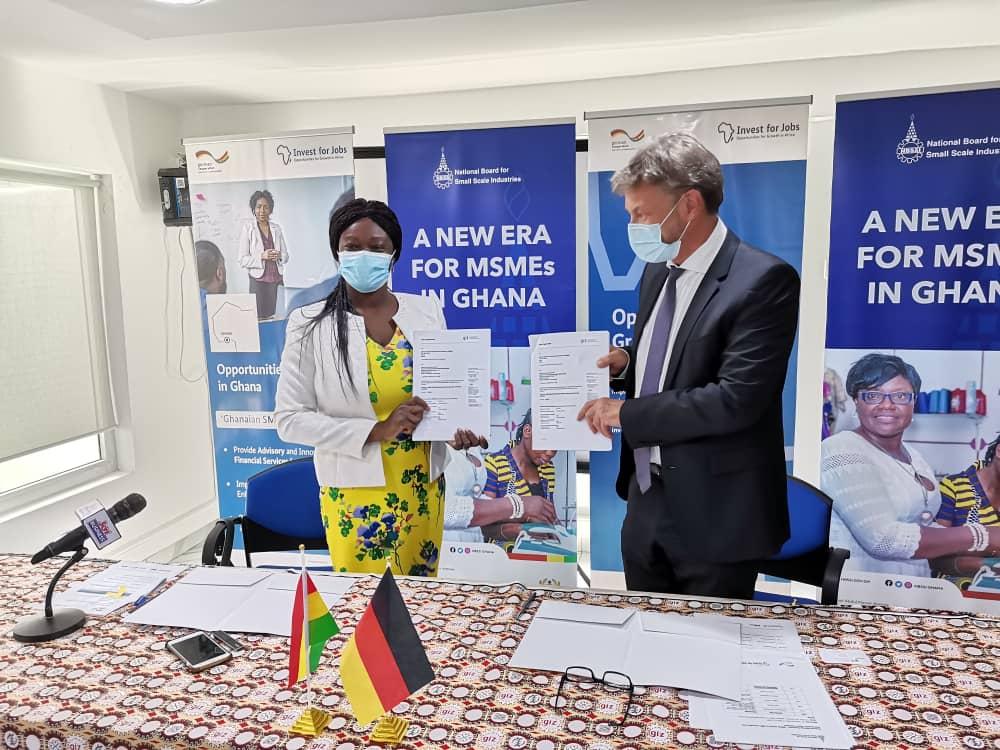The National Board for Small Scale Industries (NBSSI) and the German Development Agency (GIZ) have signed a 1.5 million Euro grant agreement to support Small and Medium-sized Enterprises (SMEs) in Ghana.
The grant agreement dubbed ‘COVID-19 SME Innovation and Digitalisation Support Scheme,’ is expected to provide Ghanaian SMEs with digital solutions as a strategy to adapt to emerging market demands brought about by the COVID-19 pandemic.
A third partner, the Digital Transformation Centre, also implemented by GIZ Ghana, will be responsible for supporting this project with technical expertise to implement digital solutions.
The COVID-19 SME Innovation and Digitalisation Support Scheme seeks to support SMEs to make full use of digitalisation to manage their business operations more efficiently, to become more responsive to clients’ needs, to better organise their business information, to have more efficient record keeping and financial management processes in place, thereby facilitating their access to finance and much more.
Mr Gerald Guskowski, Head of the Network for Inclusive Economic Development (NIED) Cluster at GIZ-Ghana said COVID-19 had exposed the defects of digital transformation in Ghana and almost all countries around the world.
“This is why I am really excited to see that we are able to overcome these challenges and that we managed to also explore the opportunities and positive sides of the pandemic,” he said.
“This partnership will support the digitalisation of up to 500 growth-oriented SMEs, which will in turn help sustain at least 1,600 jobs. We want to keep these businesses alive and strengthen their resilience during COVID-19, thereby sustaining jobs,” added Mr Guskowski.
The COVID-19 Pandemic has had a significant adverse and debilitating impact on global economies.
World governments and donor agencies have had to restructure their budgets and funding options and realign their priorities to ensure that the economies of the world do not come crushing. In Ghana, some businesses were compelled to fold up.
On her part, Mrs Kosi Yankey-Ayeh, the Executive Director of NBSSI said the partnership with the Special Initiative on Training and Job Creation would provide an opportunity to increase process efficiency and competitiveness of SMEs by providing access to knowledge, technologies, and expertise in the field of digitalisation and process innovation.
“Most of us have to come to accept the fact that staying resilient during this period of COVID-19 is the new standard for progress. And, for businesses to stay resilient, formalization and digitization of their operations are a must. It helps businesses to reach out to a bigger market, erases physical barriers, makes payment for goods and services faster and easier. In addition to these benefits, it helps the government in the formulation and implementation of Micro, Small and Medium Enterprises (MSMEs) policies,” she said.
“We stand a chance to better understand and learn more the needs and challenges of SMEs, even beyond digitalisation, to support the policy agenda,” added Mrs Yankey-Ayeh.
“With COVID-19 still lurking, digitalisation of SMEs remains a front burner issue on the SME policy agenda in Ghana. Consequently, the signing of this agreement marks a critical turning point for SMEs in Ghana, and we are happy to be spearheading this,” she said.
Mrs Yankey-Ayeh said it was in line with the objective of the Government of Ghana and the NBSSI to ensure that most of the MSMEs in Ghana get formalized to help government and the Board to direct support to MSMEs, tailor trainings to meet the need gaps of the MSMEs, and connect businesses to bigger markets.
“As NBSSI transitions to the Ghana Enterprises Agency (GEA) in a few weeks, this MoU could not have come at a better time. The new Agency will make the formalization and digitization drive a very important part of our agenda,” she added.









Discussion about this post